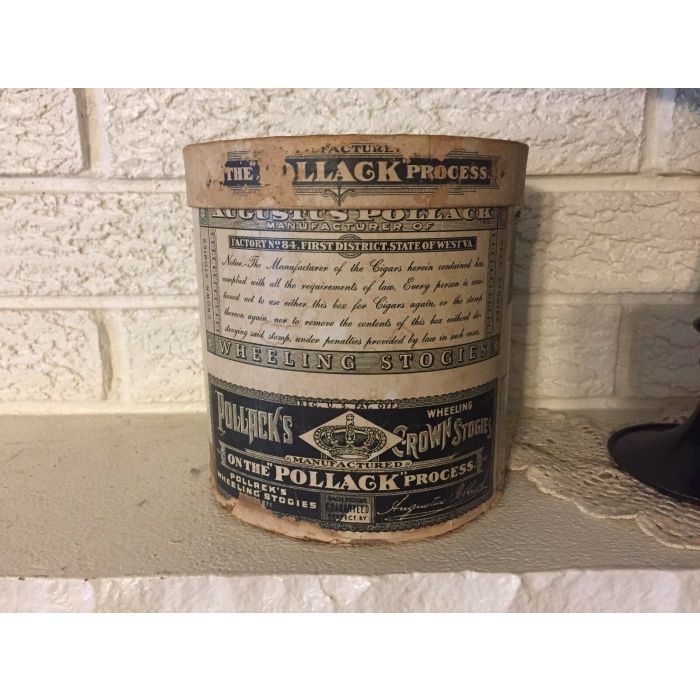***Sorry Sold***Rare Early C1880 Cigar box Augustus Pollack's Stogies Wheeling West Virginia
$65.00
Out of stock
SKU
A340
Rare Early Circa 1880 round cardboard cigar box Augustus Pollack's Stogies. Manufactured Wheeling West Virginia'
Very early (Ca. 1880’s) round paper labeled cardboard cigar box for Augustus Pollack Co.’s Crown Stogies, w/ beautiful, highly detailed stone litho wrap-around paper label showing factory building and busy street scene. 6" High x 5.5". Condition shows wear as Pictured.
From The Internet: Biography: Augustus Pollack
The Stogie King
Augustus Pollack (1830-1906) established a notions and fancy goods business in Wheeling in 1854. A German, Pollack was an active member of Wheeling’s large German immigrant community. He helped establish a German American volunteer company during the Civil War and later a German language newspaper. He also helped raise money for the widows and orphans of German soldiers killed in the Franco-Prussian War (1870-71). Pollack served on the board of Wheeling Library Association (precursor to the Ohio County Public Library) and was named president of Wheeling’s 1885 Saengerfest (a German singing festival).
Founded in 1871, Pollack’s signature business, Crown Stogies, grew to become West Virginia’s largest cigar manufacturer. When built, his factory spanning 18th and 19th Streets from Chapline to Eoff was one of the largest cigar factories in the world. In his 1906 obituary, the Wheeling News-Register declared, “no one deserves more credit for the Wheeling stogie’s prestige.”
Pollack did not ask or expect more of his employees than he did of himself. He paid them well for the period, and maintained an open door policy regarding employee concerns over work conditions, hours, and wages – an unusually progressive attitude for a nineteenth century entrepreneur. While his contemporaries in steel and coal faced regular and often violent struggles over labor issues, Pollack’s employees remained comparatively loyal and content. His policies influenced other local stogie manufacturers. Pollack refused, as he pondered retirement, to sell his factories to buyers who would not honor the pact he had made with his employees regarding their labor concerns.
After his April 23, 1906 death, The Ohio Valley Trades and Labor Assembly called a special meeting to
encourage all the members of local trade unions to attend Pollack’s funeral. The pall-bearers were chosen from his employees, who, along with their union brethren, publicly demonstrated their affection for him in an unusual manner. The Garfield Assembly of International Stogie Makers spearheaded a collection of donations to erect a large monument in Pollack’s honor. Depicting a handshake between employee and employer, the monument was placed in a prominent position on the grounds of Wheeling’s city building. It was later moved to its current home on Main Street near the Fort Henry Bridge.
Rare Early Circa 1880 round cardboard cigar box Augustus Pollack's Stogies. Manufactured Wheeling West Virginia'
Very early (Ca. 1880’s) round paper labeled cardboard cigar box for Augustus Pollack Co.’s Crown Stogies, w/ beautiful, highly detailed stone litho wrap-around paper label showing factory building and busy street scene. 6" High x 5.5". Condition shows wear as Pictured.
From The Internet: Biography: Augustus Pollack
The Stogie King
Augustus Pollack (1830-1906) established a notions and fancy goods business in Wheeling in 1854. A German, Pollack was an active member of Wheeling’s large German immigrant community. He helped establish a German American volunteer company during the Civil War and later a German language newspaper. He also helped raise money for the widows and orphans of German soldiers killed in the Franco-Prussian War (1870-71). Pollack served on the board of Wheeling Library Association (precursor to the Ohio County Public Library) and was named president of Wheeling’s 1885 Saengerfest (a German singing festival).
Founded in 1871, Pollack’s signature business, Crown Stogies, grew to become West Virginia’s largest cigar manufacturer. When built, his factory spanning 18th and 19th Streets from Chapline to Eoff was one of the largest cigar factories in the world. In his 1906 obituary, the Wheeling News-Register declared, “no one deserves more credit for the Wheeling stogie’s prestige.”
Pollack did not ask or expect more of his employees than he did of himself. He paid them well for the period, and maintained an open door policy regarding employee concerns over work conditions, hours, and wages – an unusually progressive attitude for a nineteenth century entrepreneur. While his contemporaries in steel and coal faced regular and often violent struggles over labor issues, Pollack’s employees remained comparatively loyal and content. His policies influenced other local stogie manufacturers. Pollack refused, as he pondered retirement, to sell his factories to buyers who would not honor the pact he had made with his employees regarding their labor concerns.
After his April 23, 1906 death, The Ohio Valley Trades and Labor Assembly called a special meeting to
encourage all the members of local trade unions to attend Pollack’s funeral. The pall-bearers were chosen from his employees, who, along with their union brethren, publicly demonstrated their affection for him in an unusual manner. The Garfield Assembly of International Stogie Makers spearheaded a collection of donations to erect a large monument in Pollack’s honor. Depicting a handshake between employee and employer, the monument was placed in a prominent position on the grounds of Wheeling’s city building. It was later moved to its current home on Main Street near the Fort Henry Bridge.
. BH 601 09/23/17
Write Your Own Review

